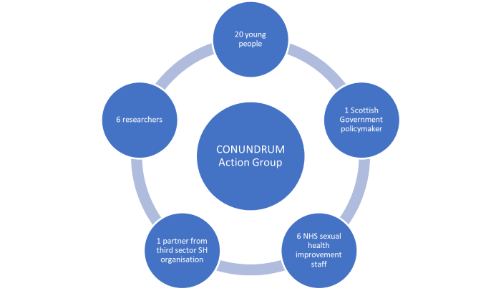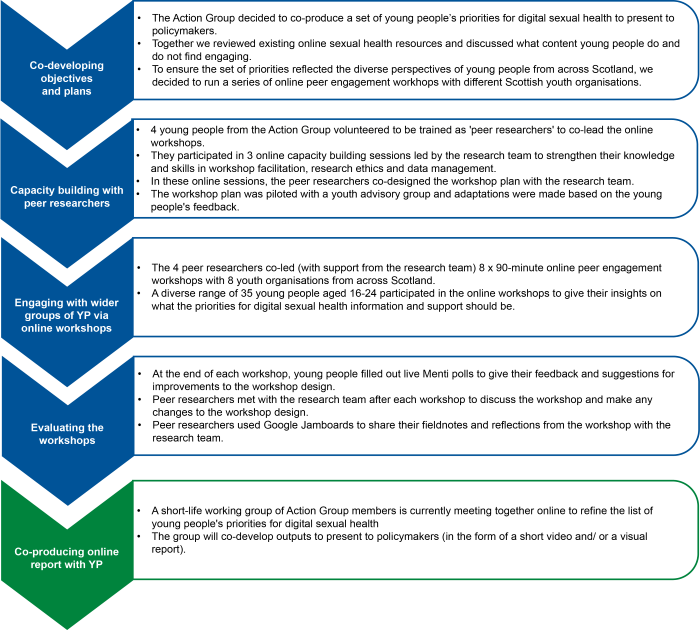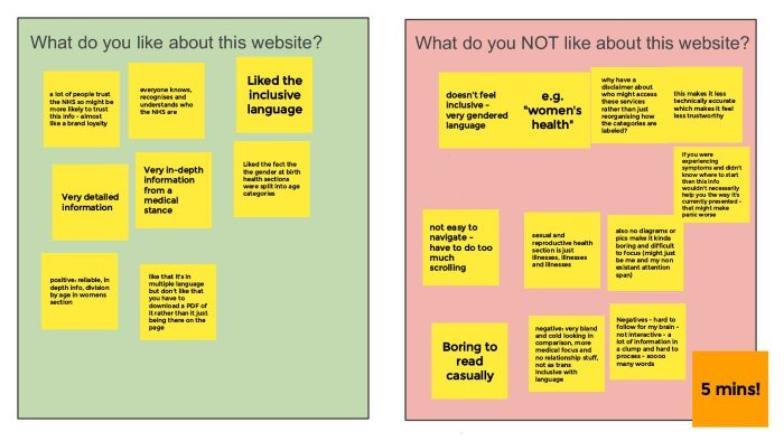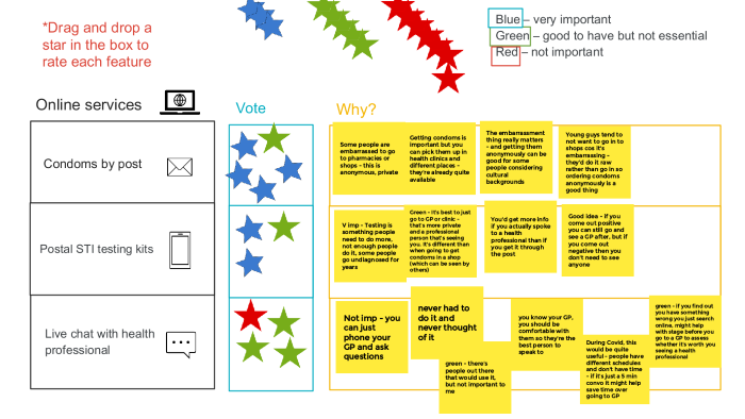Co-producing research with young people online: Insights from a participatory sexual health project
Published: 22 November 2022
Initial insights from a series of online peer-led workshops that were carried out with young people as part of CONUNDRUM Action.
Published 22nd November 2022
By Billie Turner, Ruth Lewis, Carolyn Blake, Rebecca Gascoigne and the CONUNDRUM Action Group.
For co-production initiatives looking to foster collaboration among different groups of stakeholders, the increasing use of online platforms presents exciting opportunities to bring people together in the same virtual room. Participants can attend meetings from a place that suits them, and digital tools such as virtual whiteboards, live chat functions and interactive polling create multiple ways to share and discuss ideas. However, there are also several challenges to doing co-production online: interactions between participants may be less spontaneous, opportunities to build rapport and develop relationships are different, and navigating group dynamics remotely without the cues of in-person interaction can be hard.
In this blog post, we share initial insights from a series of online peer-led workshops that were carried out with young people as part of CONUNDRUM Action - a participatory project aiming to increase young people’s meaningful involvement in sexual health policymaking and service improvement in Scotland. We outline some of the benefits and challenges of doing co-produced peer research online, as well as some practical tips for running online peer engagement workshops.
CONUNDRUM Action: Using online co-production to understand young people’s priorities for digital sexual health
CONUNDRUM Action is a participatory sexual health project which uses online co-production to involve young people in shaping sexual health policy and service improvement. Building on our learning from an earlier study that involved young people in co-developing sexual health research, our research team wanted to create a virtual space to bring young people into direct conversation with professionals who shape sexual health policies and services. We have done this by creating an Action Group involving young people, researchers, and people with remits for sexual health improvement in government, NHS and the third sector (see figure below).

- 14 young people from Contraception: Education and Reform Team, Scotland (CERT)
- 6 young people from Waverley Care Young People’s Panel
- A sexual health policymaker in Scottish Government
- NHS health improvement staff from three NHS Scotland health boards (Greater Glasgow and Clyde, Lanarkshire and Lothian)
- Partners from the third sector (Waverley Care)
- The CONUNDRUM research team from the University of Glasgow and a sexual health researcher from the University of Southampton.
The Action Group has been working together online since February 2022. We meet on Zoom and use a range of digital tools and platforms (e.g. Google Jamboard, Menti, Padlet, Discord and Slack) to share ideas, dialogue, and feedback in and between meetings.
In our last blog post, we described how the Action Group decided on three things they wanted to collaborate on as a group. One of these was prompted by policymakers within the Action Group saying that they wanted to understand what young people in Scotland want from online sexual health information and support. As a result, the Action Group decided to conduct peer engagement workshops with young people living across Scotland to help develop a set of priorities for digital sexual health information and support. The Action Group decided to use a peer research approach, where young people from the Action Group were involved in co-leading the workshops, with support from the research team.
The stages in this online peer research process can be seen below:

Screenshots of Google Jamboards from the online peer engagement workshops

Activity 1 focused on evaluating the content and format of two existing sexual health websites: Brook and NHS Inform. Peer researchers asked young people to give feedback on what they liked and did not like about each website, and how much they trusted the information and why.

Activity 2 Peer researchers gave young people 12 examples of digital features/ tools that could be used to support sexual health and asked them to rate how important they felt each would be and explain why.
Benefits of using an online co-production approach to carry out peer engagement workshops
For the research: |
|
|
Increased accessibility |
|
|
Achievable within the limited project timeframe |
|
|
Live evaluation |
|
For the peer researchers: |
|
|
Reasonable time commitment |
|
|
Capacity building opportunities for peer researchers |
|
|
Feedback from peer researcher Co-facilitating the workshops and stakeholder interviews has been an insightful and rewarding experience. Whilst CERT members have highlighted young people’s views throughout the CONUNDRUM Action project, it has been invaluable to gain access to other young people’s digital sexual health priorities, particularly beyond our own demographics. As an organisation, CERT believe that sexual health policy should be representative of all those it encompasses and conducting these workshops has been essential to ensuring CONUNDRUM Action meets its goals. On a personal level, it has provided CERT members with fantastic facilitation experience, undoubtedly supporting them to fulfil future professional goals. These facilitation experiences have granted CERT members involved in CONUNDRUM Action an interactive and enjoyable opportunity to improve our policy skills. - Rebecca Gascoigne, CERT (Contraception: Education and Reform Team, Scotland) |
|
For the workshop participants: |
|
| Enabled young people to participate on own terms |
|
| Privacy and confidentiality of participants |
|
|
Feedback from live Menti poll with workshop participants:
|
|
Challenges of using an online co-production approach
| Variation in digital access |
|
| Less control over set up/ environment than in-person |
|
| Challenges navigating group dynamics |
|
Based on our learning from CONUNDRUM Action, here are some tips on how to support peer researchers to facilitate online engagement workshops with other young people. We hope these insights are useful for anyone interested in using online methods for co-production /peer research in future work.
| Preparation |
|
| During workshops |
|
| After workshops |
|
Thanks to everyone who has participated in CONUNDRUM Action so far! If you would like to get involved, or if you have any comments or questions about the project, please get in touch at sphsu-conundrum@glasgow.ac.uk. You can also find project updates on Twitter at #ProjectCONUNDRUM.
First published: 22 November 2022
<< 2022

